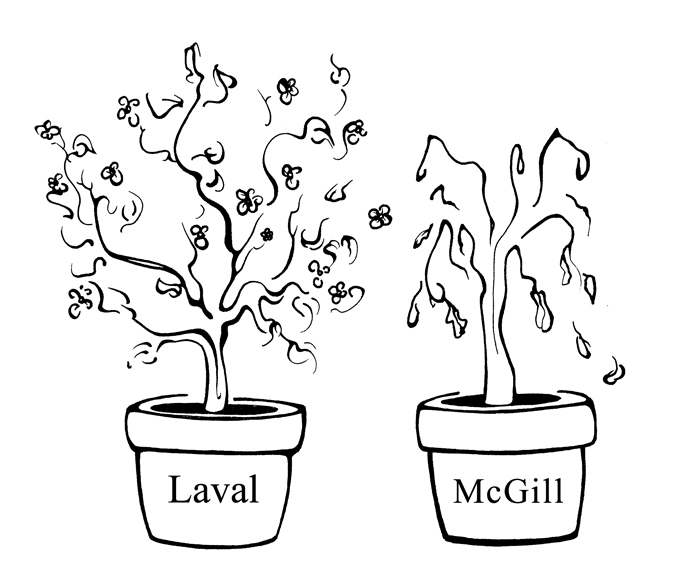On Feb. 15, Université Laval became the first Canadian university to commit to divest its endowment fund from fossil fuel-related companies. Fossil fuel investments made up an estimated five to 15 per cent of the university’s total endowment—equivalent to $11 to 30 million—according to Alice-Ann Simard, founder of ULaval sans fossiles and Master’s student in Business Administration at Université Laval.
This outcome for ULaval sans fossiles came after a three-month campaign, during which the activist group held talks, handed out buttons and stickers, and sparked conversation on campus about divestment from fossil fuels. After the activists garnered support from the general student body, undergraduate and graduate student associations, and the Quebec Chapter of the David Suzuki Foundation, the university administration asked to meet with ULaval sans fossiles. According to Simard, members of the administration discussed the university’s commitment to sustainability and expressed their willingness to divest from fossil fuel companies.
The ULaval sans fossiles campaign was identical to those at other universities across Canada, such as Divest McGill and Divest UBC, but achieved its goal very quickly. According to Simard, the difference for ULaval sans fossiles was that their message fell on receptive ears. Ranked second in the world in sustainable development on the Sustainability Tracking, Assessment & Rating System (STARS) index, Université Laval has already worked to become a carbon-neutral campus.
“[The university administration] saw this opportunity to become leaders in the divestment movement in Canada and it was really [in alignment] with their image,” Simard said. “[….The administration] saw this wonderful opportunity to commit [to divestment] and to be the first to commit, because that’s in their values and in the university’s values.”
Despite the rejection of their petition calling McGill administration to divest from fossil fuels in March 2016, climate activist group Divest McGill continues to actively lobby the university to reverse this decision. According to a statement released by Divest McGill following Université Laval’s choice to commit to divest, ULaval sans fossiles’ success has only served to heighten Divest McGill’s energy.
“It is incredibly encouraging for us to see university administrators elsewhere in Canada finally side with students and science over the interests of the fossil fuel industry,” Jed Lenetsky, U2 Environment and Divest McGill organizer, was quoted in the statement. “Hopefully, this brave first step by Université Laval will give McGill administrators the necessary courage to take action for justice; to take the community’s longstanding calls for divestment to heart and commit to a more ethical endowment fund.”
Divest McGill Organizer Julia Bugiel, U3 Arts, said that because Université Laval is now credited as the first Canadian university to commit to divest, what remains for other universities is a race to avoid being the last to do so.
“Divest McGill has been asking McGill’s administration for years to put their money where their mouth is and to be the leader [in sustainability] that they always say they are,” Bugiel said. “McGill has lost that chance […], but they still can follow in the footsteps of schools, like [Université Laval], that are making those forward-thinking steps.”
On March 7, the Committee to Advise on Matters of Social Responsibility (CAMSR) met for the first time since its decision not to divest from fossil fuels in March 2016. According to Bugiel, this meeting served as an important resurgence into the public eye for Divest McGill, which held a rally outside the James Administration building at the same time.
“I think that ULaval sans fossiles and their campaign [sends] a strong message to the [McGill Board of Governors]–the only difficulty is how do we make sure that every single member of the Board of Governors is receiving that strong message,” Bugiel said. “[….] A very important thing coming off of this [Université Laval] divestment decision is to use that to strengthen [students’] efforts towards divestment and to remind the community that Divest McGill is still here.”
A previous version of this article incorrectly stated that Université Laval is the first Canadian university to divest its endowment funds from fossil fuel-related companies. In fact, Université Laval has only committed to divestment at this point in time and has not yet divested from fossil-fuel related companies. The Tribune regrets this error.









